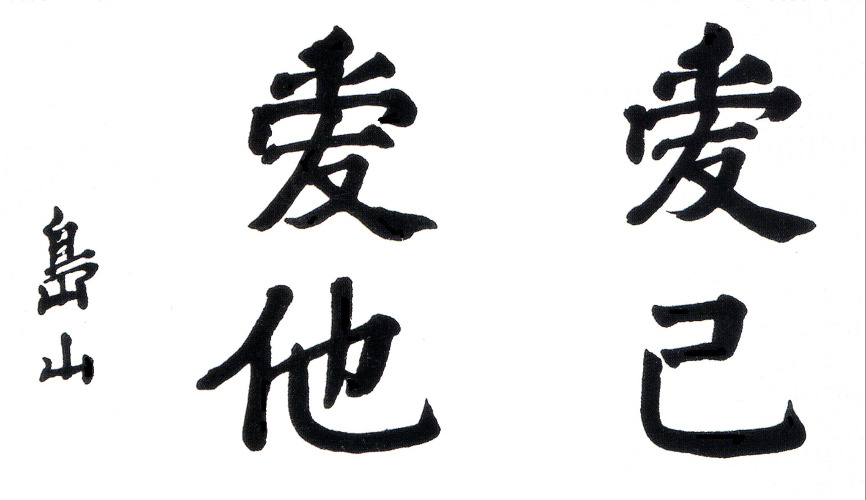Thank you to All at JNCTV for this interview and respect for Dosan
Examples of Dosan's Four Principles
"Let us establish the basis of the success of our great and holy works on truth and righteousness and not fallacy and deceit." Dosan
Dosan's Four Principles
In order to better understand Dosan's achievements and thoughts, thorough understanding of his four ideals is necessary. Dosan’s four principal ideals of: Mooshil (truth), Ryukhang (action), Choongeui (loyalty), and Yonggam (bravery) could be described with one concept - sincerity.
The philosophy of strength was not simply the ideal of imperialism based on the weak becomes the victim of the strong. The strength that Dosan was talking about always had the individual as its core. This individual possessed much love of himself and for others and earnestly pursued human dignity and integrity. This philosophy enclosed humanism, the love for humanity, and attributed the theory of success and failure to individuals' character. Dosan, however, was not a moralist who was cultivating and pursuing the perfect personality and character. Because of his broad activities and influences, he was viewed as many different types of thinker and leader. Dosan was viewed as a politician, an activist of the independence movement, an educator, a revolutionist, a hero and even as a cautious, timid ordinary person. No matter what type of person he portrayed and no matter what kind of situation he was in, the principle of sacrifice and selflessness was always with him.
Moral Strength
Dosan believed that national independence would be possible when sufficient strength was built in various sectors and levels in society. Dosan thought that real base of the power was moral, ethical healthiness. The first step toward strengthening ability required the development of respectability. Without having proper moral values, neither a powerful nation nor a capable individual could be achieved. Dosan viewed individualistic values such as sincerity, honesty, and endeavor as sources for moral strength. Cultivation of respectable characters equipped with strong moral was, in fact, a direct process of strengthening ability and, therefore, expanding national power.
ChatGPT AI reply regarding Dosan's Four Principles
ChatGPT has become a popular topic of discussion. Here are explanations of Dosan's four principles generated by ChatGPT.
Dosan Ahn Chang Ho developed four principal ideals that he believed were essential for building strong individuals and a strong society.
These ideals are Mooshil, Ryukhang, Choongeui, and Yonggam.
Mooshil (Truth) - Mooshil means seeking and speaking the truth. Dosan believed that truthfulness is the foundation of all good relationships and that only by facing and acknowledging the truth can one truly grow and improve.
Ryukhang (Action) - Ryukhang means putting truth into action. Dosan believed that knowing the truth is not sufficient, and one must take action to bring about positive change in the world.
Choongeui (Loyalty) - Choongeui means being loyal to one's principles and values. Dosan believed that true loyalty comes from staying true to one's principles, rather than blindly following others.
Yonggam (Bravery) - Yonggam means having the courage to take risks and overcome challenges. Dosan believed that true bravery comes from standing up for what is right, even in the face of opposition.

"An organization without respect for the truth is like a body without blood, or a brick fence without mortar. An organization without sympathy and love for its principles, its members and its leaders will eventually fail no matter how rich or strong it is today." Dosan

Young Korean Academy Hungsadan Flag
"Geese have four virtues. First, they stand for 'reliability', because they fly south when it is cold and fly north when it is warm in amazing regularity. They stand for courtesy because they communicate with each other, from the front to the rear and from the rear to the front. Third, they stand for fidelity because they do not seek a new mate when the old one dies. Fourth, they stand for wisdom because they take turns and stand watch while they sleep at night, and during the day, to avoid hunters."

"He loved learning and
Accumulated wisdom
All for recovering our nation
He loved teaching
Virtue and words
All for serving the people
Honest, genuine,
He treated people with love
Like a warm breeze.
He devoted himself to his work
For the good of the public, not the individual.
He depicts the dignity of the autumn frost."
Inscription on one of Dosan's grave markers written by his friend Yi Kwang Su.

"Dosan Ahn Chang Ho was a man of high morals and very talented in organizing. An idealist in his thoughts and actions, yet he did not overlook the realities of daily living. He always was very devoted to his friends, but he did not tolerate those who defied principles that he regarded as sacred. he was kind hearted, but he did not compromise his principles. Dosan Ahn Chang Ho did not go to college, but he learned a great deal through his school experience. his wisdom, bravery and self discipline surpass those of anyone with a college diploma..."
Dr. Philip Jaison aka Soh Jae Pil
Dosan was a Builder of Institutions

Mutual Assistance Association
Kongnip Hyophoe
Established in
San Francisco 1905

New People's Association Shinminhoe 1907. It was originally founded in Hawaii in 1903. Kang Youngseo and Hang Un were original members from Hawaii who came to California and revived their ideas with Dosan.

Korean National Association
Kungminhoe
Founded 1908
Established February 1, 1909
Dosan was in Korea when the KNA started. He was not involved with KNA until he came back from Korea in 1911. In 1912 he joined KNA.

Meeting Claremont, CA 1916
Young Korean Academy
Hung Sa Dan
The organization was founded in San Francisco 1913

Merida, Mexico
Korean National Association est. 1909
Hung Sa Dan est. 1917

Korean Provisional Government
Imsi Chongbu
Shanghai, China 1919

Dong Myung Academy Nanjing,China 1924

United Korean Committee
Los Angeles 1941

